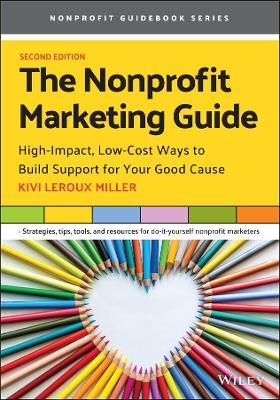
The Nonprofit Marketing Guide
John Wiley & Sons Inc (Verlag)
978-1-119-77103-6 (ISBN)
In the newly revised second edition of The Nonprofit Marketing Guide, CEO and founder of Nonprofit Marketing Guide LLC, Kivi Leroux Miller, delivers a step-by-step walkthrough of how to create an online and offline marketing program that will grow and scale with your organization.
Written with the benefit of the author’s ten years of survey data from thousands of nonprofits and experience coaching hundreds of communications pros on nonprofit marketing, the book offers practical and cost-effective strategies you can implement immediately. You’ll discover:
How to create realistic marketing strategies and communications plans for nonprofits of any size
How to build and engage of community of supporters around your organization
How to create and deliver powerful messaging that inspires action
Bonus templates and worksheets in an online workbook for readers
Whether you have any marketing or communications experience of not, The Nonprofit Marketing Guide will also earn a place in the libraries of all stakeholders in nonprofits who seek ways to help their organization grow organically.
KIVI LEROUX MILLER is the founder and CEO of Nonprofit Marketing Guide LLC, which helps nonprofit communicators learn their jobs, love their work, and lead their teams. She is also a highly rated keynote, workshop, and webinar presenter and a certified executive coach.
Preface: The Story Behind This Book xv
Introduction: How to Use This Book xix
Looking for More? xxi
Part One Getting Ready to Do It Right 1
Chapter One 10 Realities of Nonprofit Marketing 3
Reality 1: Marketing Effectiveness Depends on a Confident, Skilled Professional 3
Reality 2: Marketing Effectiveness Depends on a Supportive Organizational Culture 4
Reality 3: There Will Always Be Too Much to Do 4
Reality 4: There is No Such Thing as the General Public 5
Reality 5: You Need to Manage Your Own Media Empire 5
Reality 6: Nonprofit Marketing is a Form of Community Organizing 6
Reality 7: Personal and Organizational Brands Often Blend 6
Reality 8: Good Nonprofit Marketing Takes More Time Than Money 7
Reality 9: You’ve Already Lost Control of Your Message – Stop Pretending Otherwise 7
Reality 10: Marketing is Not Fundraising, but It is Essential to It 8
Conclusion: Try Boldly, and Try Again 8
Chapter Two Defining Marketing in the Nonprofit Sector 11
The Official Definition of Marketing 12
Is This Work Called Marketing or Communications or Something Else? 14
A More Meaningful Distinction: Marketing for Fundraising or for Community Engagement 15
The Most Common Nonprofit Marketing Goals 17
The Most Common Nonprofit Marketing Strategies 18
The Most Common Nonprofit Marketing Objectives 21
The Most Common Nonprofit Marketing Tactics 24
Conclusion: If You Can Name It, You Can Own It 26
Chapter Three Nonprofit Marketing Plans in Theory – and in the Real World 27
What Goes in a Marketing Strategy 28
What Goes in a Communications Plan 32
Nonprofit Marketing the Quick-and-Dirty Way 37
Example: The American Red Cross’s “Do More Than Cross Your Fingers” Campaign 37
Conclusion: Always Think Before You Speak 40
Chapter Four How Nonprofits Increase Their Marketing Effectiveness Over Time 41
Level One – Beginner 42
Level Two – Capable 42
Level Three – Skilled 43
Level Four – Advanced 43
Level Five – Expert 44
How Much Planning is Taking Place 44
How Well Permission-Based Marketing is Managed 45
How Well Content Marketing is Managed 45
How Well Organizational Culture Supports Marketing 46
Conclusion: Give It Time and Put in the Work 47
Chapter Five Do Your Homework: Listen to the World Around You 49
Watch and Listen 50
Convene Informal Focus Groups 51
Conduct Online Surveys 53
Analyze Your Website, Email, and Social Media Statistics 54
Review Media Kits and Advertising 55
Watch for Relevant Polling and Survey Data 55
Find Conversations via Keywords and Hashtags 55
What to Do with What You Learn 56
Conclusion: Never Stop Listening 59
Part Two Answering the Three Most Important Nonprofit Marketing Questions 61
Chapter Six Define Your Community: Who Do You Want to Reach? 63
In Marketing, There’s No Such Thing as the General Public 64
Recognize That You Are Communicating with Multiple Groups of People 65
Segment Your Community into Groups 66
Use Personas, Empathy Maps, and Journeys to More Clearly Describe Your Groups 68
Avoid Cultural Stereotypes 71
Watch for Gatekeepers and Create Personas for Them, Too 71
Example: Creating Specific Personas Within a Segmented Group 72
Example: Matching Volunteers with the Right Opportunities 74
Conclusion: Don’t Jump Ahead to Tactics 74
Chapter Seven Create a Powerful Message: What Do You Want to Say? 77
The Power of One Over Many 78
The Power of Emotional Content 79
The Power of Personal Identity 81
The Power of Logic, Reason, and Statistics 83
The Power of a Clear Call to Action 85
Choosing Messages That Appeal to Your Target Community 86
Example: Matching Messages to Personas’ Values 87
Conclusion: Even the Relief Workers Want to Save the Darfur Puppy 88
Chapter Eight Spread Your Message Further by Telling Great Stories 91
Add “Storyteller” to Your Job Description 92
Tell Stories with the Challenge Plot 93
Tell Stories with the Creativity Plot 95
Tell Stories with the Connection Plot 96
Use the Six Qualities of a Good Nonprofit Marketing Story 97
Find Fresh Story Ideas 98
Interview Your Supporters for Profiles and Stories 100
Protect the Privacy of the People in Your Stories 102
Incorporate Stories into Your Communications 102
Conclusion: Stories Are a Nonprofit’s Gold Mine 104
Chapter Nine Adopt an Attitude of Gratitude 105
Donors Are Testing Nonprofits, and Nonprofits Are Failing 106
Improve Your Thank-You Notes in Six Steps 108
Create Thank-You Videos 111
Publish a Short Annual Report 112
Conclusion: Stop Making Excuses; Make the Time Instead 114
Chapter Ten Deliver Your Message: How and Where Are You Going to Say It? 115
The Seven Writing Styles for Nonprofit Communicators 116
Support Your Words with Images 118
Select the Best Communications Channels for Your Community 119
Use Multiple Channels to Reinforce Your Message 121
Put Your Message Where Your Community is Already Going 123
Example: Selecting Channels to Reach Volunteers 123
Convince Your Supporters to Open Your Email 125
Conclusion: Find the Right Mix and Give It Time to Work 127
Part Three Building a Community of Supporters Around You 129
Chapter Eleven Make It Easy to Find You and to Connect with Your Cause 131
Be Where People Are Searching for Organizations Like Yours 132
Create a Visible and Accessible Home Base 133
Give New Contacts Multiple Options for Staying in Touch 133
Keep Your Website in Good Shape 134
Improve Your Search Engine Rankings 137
Should Your Website Include a Blog? 138
Grow Your Email List 140
Build Your Social Media Presence 141
Conclusion: Don’t Let Potential Supporters Slip Away 142
Chapter Twelve Become an Expert Source for the Media and Decision Makers 143
Why Some Groups Get the Call and Others Don’t 144
The Five Qualities of a Good Expert Source 145
Seven Strategies to Raise Your Profile as an Expert Source 149
How to Pitch Your Story to the Media 152
Be Ready to Newsjack 154
Who is the Expert? You or the Organization? 156
Conclusion: Create Something New and Share It 157
Chapter Thirteen Build Engagement: Stay in Touch and Keep the Conversation Going 159
Is Your Content Like a Good Gift or a Bad Gift? 161
Strive for Shorter, More Frequent Communications in Multiple Places 163
Remember to Repurpose Your Content 165
Improve Your Social Media Engagement 166
The Email Engagement Crisis 168
Conclusion: Conversation Does Pay Off 170
Chapter Fourteen Empower Your Fans to Build More Support 171
Identify Your Wallflowers, Buddies, and Fans 173
What Makes Someone a Fan? 174
Give Your Biggest Fans the Personal Touch 175
Encourage Word-of-Mouth Marketing and Referrals 177
Be Clear About the Best Ways for People to Help 179
Encourage Your Fans to Friendraise 179
Encourage Your Fans to Fundraise 180
Approach New Friends of Friends 181
Conclusion: Build Your Social Capital 183
Part Four Doing It Yourself Without Doing Yourself In 185
Chapter Fifteen Find the Talent: Keep Learning and Get Good Help 187
Build Your Own Skills 188
Everyone on Staff is a Marketer (Like It or Not) 191
Delegate Marketing Tasks to Others 192
Empower Volunteers So They’ll Come Back Again 193
Hire Consultants and Freelancers 194
Conclusion: Know When You Need Help – And Ask for It 196
Chapter Sixteen Find the Treasure: Market Your Good Cause on a Tight Budget 197
Marketing Triage: Focus In and Forget the Rest 199
Go Casual and Friendly 200
How to Make Your Print Marketing More Affordable 202
Where to Spend Your Limited Dollars and Where to Scrimp 203
Funding Your Nonprofit Marketing Program 205
Conclusion: Zero Communications Budget = Zero Sustainability 205
Chapter Seventeen Find the Time: Get More Done in Fewer Hours 207
Stay CALM not BUSY 207
Keep Up with Best Practices, Big Brains, and Cool Kids 209
Get Fear out of the Way 210
Organize What You’ll Need Again and Again 211
Conclusion: Give Yourself a Break 214
Chapter Eighteen Conclusion: How Do You Know Whether You Are Doing a Good Job? 215
Notes 217
Glossary of Online Marketing Terms 221
Acknowledgments 225
The Author 227
Index 229
| Erscheinungsdatum | 19.05.2021 |
|---|---|
| Verlagsort | New York |
| Sprache | englisch |
| Maße | 175 x 254 mm |
| Gewicht | 386 g |
| Themenwelt | Wirtschaft ► Betriebswirtschaft / Management ► Marketing / Vertrieb |
| Wirtschaft ► Betriebswirtschaft / Management ► Planung / Organisation | |
| ISBN-10 | 1-119-77103-X / 111977103X |
| ISBN-13 | 978-1-119-77103-6 / 9781119771036 |
| Zustand | Neuware |
| Haben Sie eine Frage zum Produkt? |
aus dem Bereich


